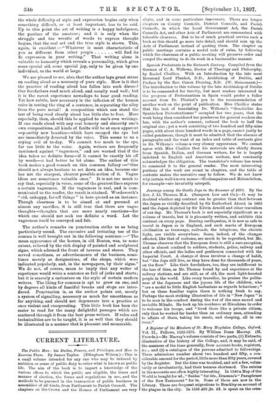Journeys among the Gentle Japs in the Summer of 1895.
By the Rev. J. Ll. Thomas, M.A. (Sampson Low and Co.)—It may be doubted whether any contrast can be greater than that between the Japan so vividly described by Sir Rutherford Alcock in 1863 and the Japan depicted by Sir Edwin Arnold and other travellers of our day. Mr. Thomas's book is not especially significant as a volume of travels, but it is pleasantly written, and exhibits this contrast on every page. Barring earthquakes, it is now as safe to travel in Japan as in England, and such marks of European civilisation as tramways, railroads, the telephone, the electric light, are visible everywhere. Some, indeed, of the changes effected, like that of costume, are much to be regretted, but Mr. Thomas observes that the European dress is still a rare exception,. and is almost confined to soldiers, students, police, railway and other officials, and the ladies and gentlemen connected with the Imperial Court. A change of dress involves a change of habit, but "the Jape still live, as they have done for thousands of years, on the floor." Like their forefathers, too, they are indifferent to the loss of time, as Mr. Thomas found by sad experience at the railway stations, and are still, as of old, the most light-hearted people in the world. Like every traveller, he praises the polite- ness of the Japanese and the joyous life of the children, who "are a model to little English barbarians as regards behaviour ; " but on these familiar topics there is nothing fresh to say. Perhaps the most striking illustration of life in "New Japan " is to be seen in the conduct during the war of the once sacred and invisible Mikado. He took up his residence at Hiroshima in order to welcome his troops, and "lived there like a private citizen, only that he worked far harder than an ordinary man, attending to affairs of State, taking his meals, and sleeping, all in one room."


































 Previous page
Previous page